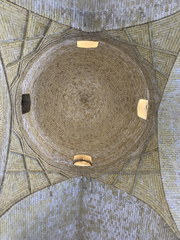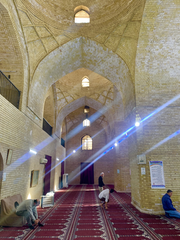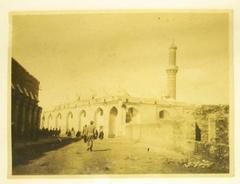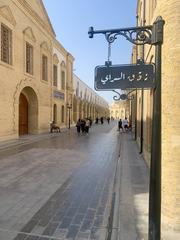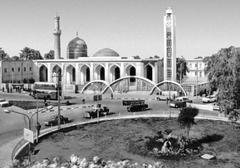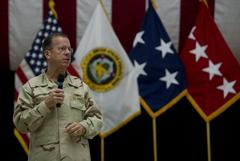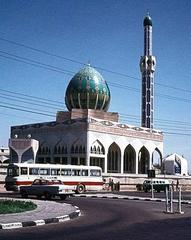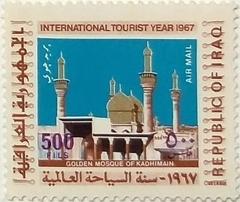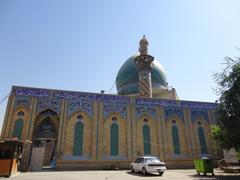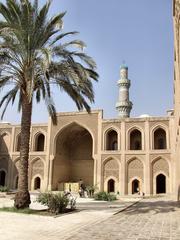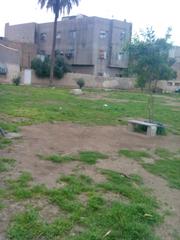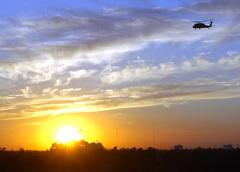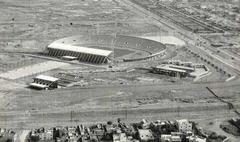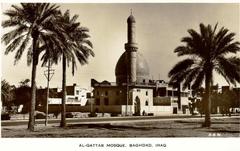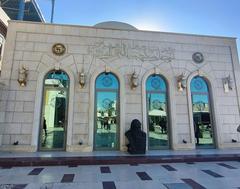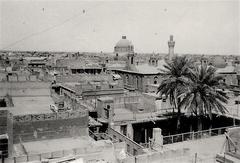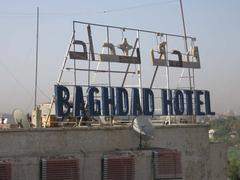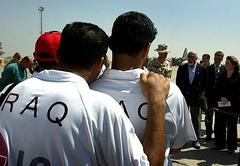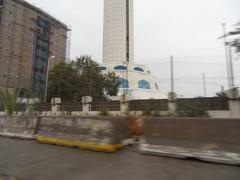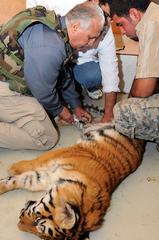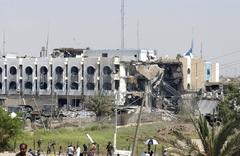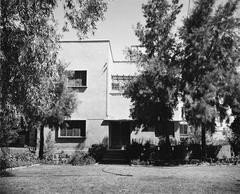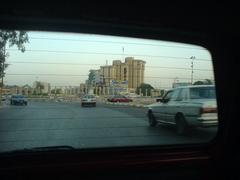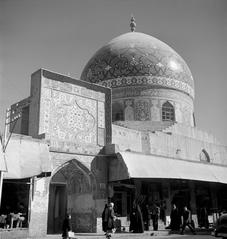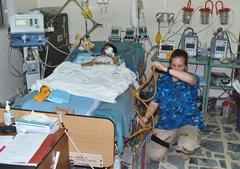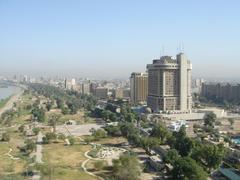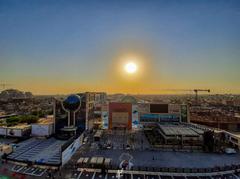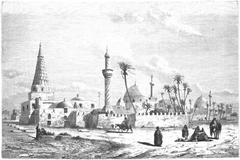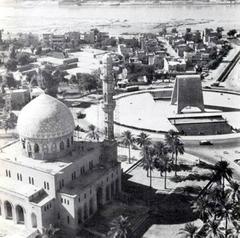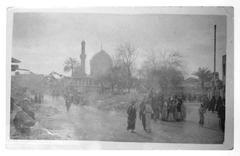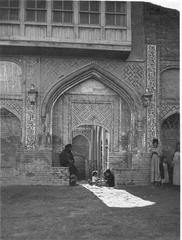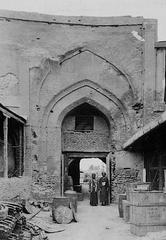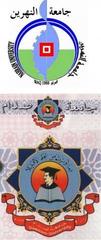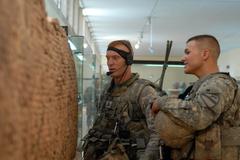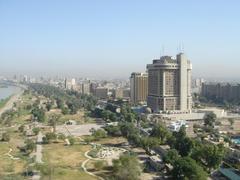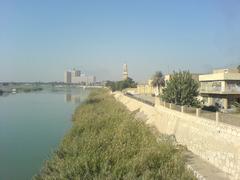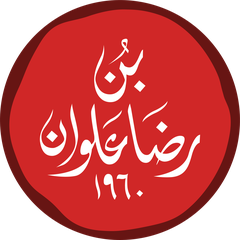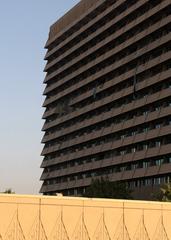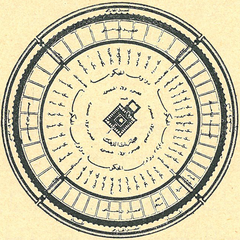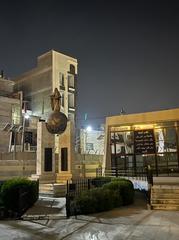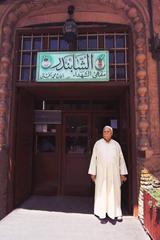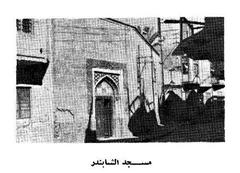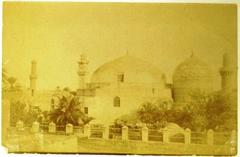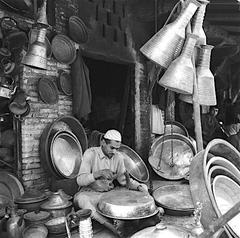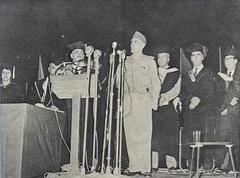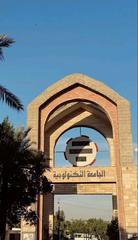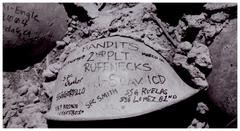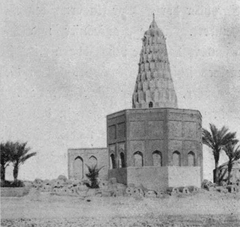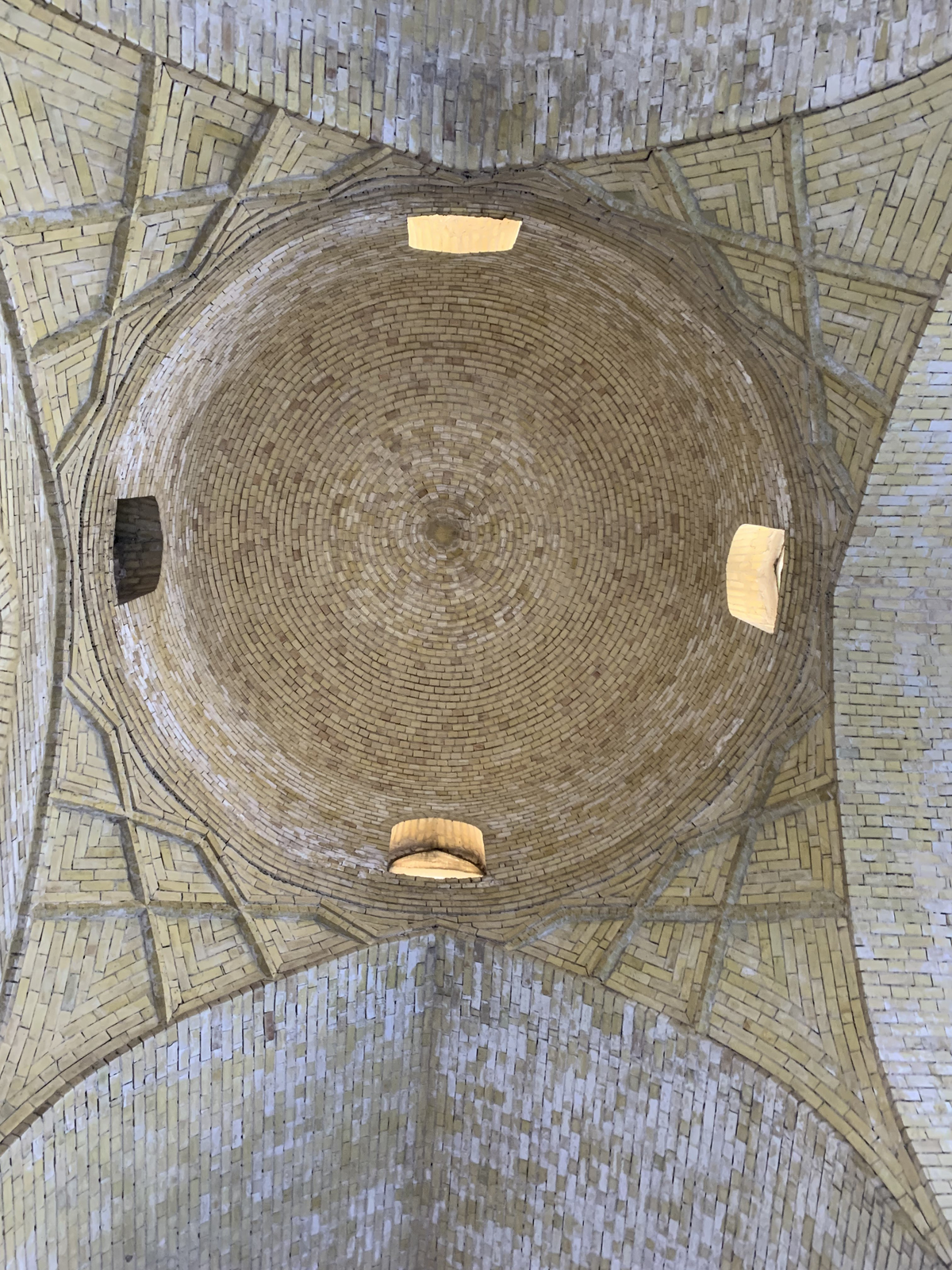
Al-Sarai Mosque: Visiting Hours, Tickets, and Historical Significance in Baghdad
Date: 14/06/2025
Introduction
Nestled in the historic core of Baghdad, the Al-Sarai Mosque stands as a distinguished testament to Iraq’s layered Islamic heritage and urban evolution. Also known as Jami’ al-Sarai, Hassan Pasha Mosque, and Al-Nasir li-Din Allah Mosque, it has played a pivotal role in shaping Baghdad’s religious, cultural, and political identity for over eight centuries. Established in 1193 CE by Abbasid Caliph al-Nasir li-Din Allah, the mosque has served as a hub for worship, learning, and civic engagement, reflecting the changing tides of Baghdad’s history—from the Abbasid era through Ottoman rule and into the modern Iraqi state.
Today, Al-Sarai Mosque is not only a place of worship but also a vital cultural landmark. Visitors can admire its distinctive Ottoman architecture, including the Qashani-tiled minaret and domed halls, while exploring its proximity to other historic sites like Al-Mutanabbi Street, the Abbasid Palace, and the al-Qishla barracks. This guide provides a thorough overview of the mosque’s history, visitor information, architectural highlights, and practical travel tips to ensure a meaningful visit to one of Baghdad’s most treasured sites. (Everything Explained Today; Wikipedia; Travel2Iraq; Platformspace)
Contents
- History and Foundation
- Architectural Features
- The Mosque in Baghdad’s Historic Core
- Preservation and Restoration
- Visiting Information
- Hours and Entry
- Dress Code and Etiquette
- Accessibility
- Guided Tours and Photography
- Nearby Attractions
- Cultural and Religious Importance
- Community Engagement and Interfaith Aspects
- Practical Tips for Visitors
- Frequently Asked Questions (FAQ)
- Conclusion
- Sources
History and Foundation
Abbasid Origins
Al-Sarai Mosque was founded in 1193 CE by Caliph al-Nasir li-Din Allah in the Souq al-Sultan quarter, near Bab al-Sultan (present-day Bab al-Muazzam). The mosque served both as a religious institution and a seat of learning, with al-Zahir, al-Nasir’s son, later establishing a library housing numerous Qurans. Historians such as Sibt ibn al-Jawzi and Ibn al-Fuwati have chronicled its importance, noting its endurance through the Mongol invasion of 1258 and its role as a bastion of scholarship. (Archnet; Everything Explained Today)
Ottoman Period and Expansion
The mosque underwent significant transformation under Ottoman rule. Sultan Suleiman the Magnificent initiated a major reconstruction in 1533, followed by further expansions in 1683 and, most notably, between 1704 and 1723 under Governor Hassan Pasha. These enhancements included the addition of domes, a Qashani-tiled minaret, and expanded prayer spaces, ultimately accommodating up to 300 worshippers in a 3,000 square meter complex. The mosque’s five gates and location near Ottoman administrative offices solidified its civic and religious status. (Everything Explained Today)
Modern Era
In the early 20th century, the mosque gained further prominence during the Kingdom of Iraq, with King Faisal I regularly attending Friday prayers, earning it the moniker “The King’s Mosque.” Minor changes during this era included the closure of certain entrances and the reorganization of its educational functions, but its central role in Baghdad’s religious life has continued unabated. (Everything Explained Today)
Architectural Features
Al-Sarai Mosque is a prime example of Baghdad’s architectural evolution, blending Abbasid foundations with Ottoman flourishes. Key features include:
- Qashani-tiled Minaret: A visually striking minaret adorned with traditional blue tiles, typical of Ottoman religious architecture.
- Domes and Prayer Halls: Multiple domes supported by central pillars, with distinct summer and winter prayer halls.
- Courtyard (Sahn): A large open courtyard for gatherings, shaded by arcades, and featuring a central ablution fountain.
- Mihrab and Minbar: Finely carved marble and wood highlight the prayer niche and pulpit.
- Five Gates: Multiple entry points reflecting the mosque’s civic role and facilitating large congregations.
- Ancillary Spaces: Historical records and photographs reveal the presence of a madrasa and library, reinforcing the mosque’s educational mission. (Platformspace; al-Menasa)
The Mosque in Baghdad’s Historic Core
Strategically located in al-Rusafa, on Zuqaq al-Sarai, the mosque is surrounded by a tapestry of historic sites—Al-Mutanabbi Street, Al-Sarai Market, the al-Qishla clock tower, Bait al-Wali, and the Abbasid Palace. Its placement at the heart of Baghdad’s administrative and commercial districts underscores its longstanding importance as a religious, cultural, and civic anchor. The mosque has also witnessed key historical events, such as the 1920 Iraqi uprising, when it served as a gathering point for protesters. (IINA News; Platformspace)
Preservation and Restoration
Despite periods of neglect and damage—including a major flood during King Faisal I’s reign that altered its original layout—Al-Sarai Mosque has benefited from recent restoration projects. The 2024 initiative by the Baghdad Municipality and local heritage organizations focuses on structural repairs, minaret stabilization, and the revitalization of the mosque’s surroundings, blending traditional craftsmanship with modern conservation. (Everything Explained Today; IINA News; al-Menasa)
Visiting Information
Hours and Entry
- Open Daily: 8:00 AM to 6:00 PM. Hours may be extended during Ramadan and special religious occasions.
- Peak Times: Friday prayers (12:00 PM–2:00 PM) are the busiest; non-Muslim visitors should avoid these times.
- Tickets: Entry is free. Donations for mosque maintenance are welcome. (Adequate Travel)
Dress Code and Etiquette
- For Men: Long trousers, shirts with sleeves.
- For Women: Headscarf, long sleeves, loose-fitting clothing covering arms and legs. An abaya may be requested or provided.
- Shoes: Remove before entering the prayer hall—use provided racks or bring a plastic bag.
- Behavior: Maintain silence and decorum; ask for permission before photographing people or activities.
Accessibility
The mosque provides ramps for wheelchair access to the courtyard and prayer hall, though some surrounding areas have uneven surfaces due to historic architecture. Facilities for the elderly and disabled are available but limited.
Guided Tours and Photography
- Guided Tours: Can be arranged through local agencies or by contacting the mosque administration.
- Photography: Permitted in the exterior and courtyard areas. Always seek permission before taking photos inside, especially during prayers.
Nearby Attractions
- Al-Mutanabbi Street: The literary heart of Baghdad, lined with bookshops and cafés.
- Al-Sarai Market: Bustling market for books, stationery, and traditional goods.
- Al-Qishla Barracks and Clock Tower: Historic Ottoman complex.
- Abbasid Palace: Remnants of Baghdad’s medieval past.
- Mustansiriya Madrasah: Renowned medieval Islamic school.
Cultural and Religious Importance
Al-Sarai Mosque remains a focal point for Baghdad’s Sunni community. It hosts daily and Friday prayers, educational sessions in Quranic recitation and Islamic jurisprudence, and special celebrations during Ramadan and Eid. Its enduring presence and accessibility have made it a center for religious life and a symbol of Baghdad’s resilience.
Community Engagement and Interfaith Aspects
While primarily Sunni, the mosque is situated in a multi-religious district, reflecting Baghdad’s tradition of pluralism. Interfaith events and charitable activities, such as food distribution during Ramadan, are sometimes held, reinforcing its commitment to community service and mutual respect. (adeebatourandtravels.com)
Practical Tips for Visitors
- Best Times: Visit outside of prayer times and avoid Fridays for a quieter experience.
- Cash: Bring small denominations for donations and market purchases.
- Language: Arabic is the main language; basic phrases or a translation app can be handy.
- Security: Carry your passport, expect security checks, and avoid large bags or electronics.
- Weather: Spring and autumn are ideal for visits; summers are extremely hot.
- Guides: Hire a local guide for richer historical context and easier navigation.
Frequently Asked Questions (FAQ)
Q: What are the visiting hours for Al-Sarai Mosque?
A: Open daily from 8:00 AM to 6:00 PM. Extended hours during Ramadan and major holidays.
Q: Is there an entrance fee or do I need tickets?
A: No, entry is free. Donations are appreciated.
Q: What should I wear?
A: Modest attire—long trousers and sleeves for men; headscarf and loose, long-sleeved clothing for women.
Q: Is the mosque accessible for disabled visitors?
A: Ramps are available, but expect some uneven surfaces.
Q: Can I photograph inside?
A: Yes, with permission, especially in the prayer hall and during non-prayer times.
Q: Are guided tours available?
A: Yes, through local agencies or the mosque administration.
Conclusion
The Al-Sarai Mosque is a remarkable reflection of Baghdad’s spiritual and architectural legacy. Its layered history—from Abbasid origins to Ottoman grandeur and modern revitalization—offers visitors a unique lens into the city’s resilience and cultural richness. By observing local customs, planning your visit around prayer times, and exploring the surrounding historic district, you’ll gain a deep appreciation for both the mosque and the vibrant city it anchors.
For the latest updates on visiting hours, restoration projects, and cultural events at Al-Sarai Mosque, download the Audiala app and follow our social media channels. Start your journey into Baghdad’s living history today!
Sources
- Everything Explained Today
- Wikipedia
- Travel2Iraq
- Platformspace
- Shafaq News
- Visit Iraq Now
- Adequate Travel
- al-Menasa
- audiala.com
- IINA News
- adeebatourandtravels.com
